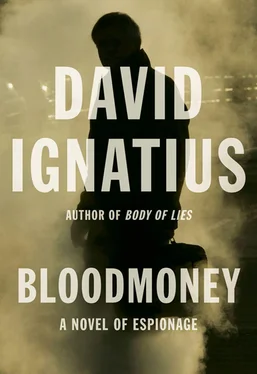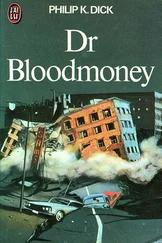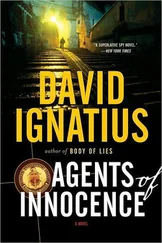David Ignatius - Bloodmoney
Здесь есть возможность читать онлайн «David Ignatius - Bloodmoney» весь текст электронной книги совершенно бесплатно (целиком полную версию без сокращений). В некоторых случаях можно слушать аудио, скачать через торрент в формате fb2 и присутствует краткое содержание. Жанр: Шпионский детектив, на английском языке. Описание произведения, (предисловие) а так же отзывы посетителей доступны на портале библиотеки ЛибКат.
- Название:Bloodmoney
- Автор:
- Жанр:
- Год:неизвестен
- ISBN:нет данных
- Рейтинг книги:4 / 5. Голосов: 1
-
Избранное:Добавить в избранное
- Отзывы:
-
Ваша оценка:
- 80
- 1
- 2
- 3
- 4
- 5
Bloodmoney: краткое содержание, описание и аннотация
Предлагаем к чтению аннотацию, описание, краткое содержание или предисловие (зависит от того, что написал сам автор книги «Bloodmoney»). Если вы не нашли необходимую информацию о книге — напишите в комментариях, мы постараемся отыскать её.
Bloodmoney — читать онлайн бесплатно полную книгу (весь текст) целиком
Ниже представлен текст книги, разбитый по страницам. Система сохранения места последней прочитанной страницы, позволяет с удобством читать онлайн бесплатно книгу «Bloodmoney», без необходимости каждый раз заново искать на чём Вы остановились. Поставьте закладку, и сможете в любой момент перейти на страницу, на которой закончили чтение.
Интервал:
Закладка:
4
The afternoon was burning itself out in the old quarter of the city known as Saddar Town. The pink hazy light of dusk suffused the stucco buildings, but it would be gone before long. Howard Egan took a taxi to Mohammad Ali Jinnah Road, a mile north of the hotel, and wandered around the market where the old textile weavers hawked their goods. He didn’t turn to look for watchers, not even once. That was the hardest part before a meeting, to suppress the instinctual desire to see who might be following you.
Egan surveyed the old stock exchange; garlands of twinkling bulbs were draped from the roof like strings of pearls. To the southeast, past the “salty gate” of Kharadar, a half-moon was rising over the Arabian Sea. Pedestrians were spilling into the road, careening away like gulls at the approach of every car.
On the main streets, under the glare of the streetlights, the merchants and beggars were shouting for attention, and the car drivers were squawking their horns. But in the lee of the traffic, in the old shop stalls, there was a muffled quiet and you could hide yourself, as if in the folds of time.
The briefcase was heavy on Egan’s shoulder, and he was beginning to sweat through his shirt. That wouldn’t do. He sat in an air-conditioned coffeehouse on Jinnah Road until he had cooled off. At six-thirty he hailed a cab and traveled down Chundrigar Road to the Habib Bank Tower. Once, this had been Pakistan’s tallest building; but after thirty years of baking in the sun while other giant buildings sprouted nearby, it had become just another ziggurat of bleached concrete.
Egan sat in the air-conditioned lobby to cool off, and a few minutes before seven, he took the elevator to the eighteenth floor. Hamid Akbar’s secretary nodded in humble recognition. Egan had visited only a few months before. Akbar came out of the office to greet him.
“How do you do? How do you do?” Akbar took the American’s hand. “Beastly weather.”
Akbar was sweating, too. There were damp crescents under the arms of his tan suit, and the top of his shirt collar was moist. Well, why not? It was June. His face was soft and pudgy in the cheeks. He didn’t wear a mustache. He looked like the sort of ambitious young man who might join the Karachi chapter of the Young Presidents Organization: a man who wanted to meet foreigners, exchange business cards. He was a generation removed from the heat and dust.
Egan began his patter about Alphabet Capital’s new fund. It was called Oak Leaf II. Its predecessor, Oak Leaf I, was doing splendidly. Second-quarter returns could top 30 percent, on an annualized basis. It was an excellent new opportunity for clients such as Mr. Akbar.
“Tip-top,” said the Pakistani. “Very impressive, I am sure.”
Akbar listened politely to the rest of the presentation, but he was distracted. When Egan finished, there was an awkward pause.
“It’s just that I am a bit strapped now,” said Akbar. “It’s not possible.”
Akbar cleared his throat. He opened his desk drawer and removed a piece of paper, which he pushed across the teak desktop toward Egan. It had an address in a suburban district of northwest Karachi. “11-22 Gilani Buildings, Sector 2, Baldia Town.” Below that was a time. “2100.”
Egan studied the paper and committed the information to memory. He took his pen from his coat pocket and wrote on the note:
“Tonight?”
Akbar nodded. He let the paper sit. He didn’t want to touch it. Egan pointed toward the message and crossed his hands in an X. Get rid of it. Akbar took the note and excused himself. Thirty seconds later there was the sound of a flush, and the Pakistani emerged from the toilet adjoining his office. He had combed his hair, but you could see the beads of sweat on his scalp.
Egan went back to his investment pitch. He talked about flexible minimums and alternative investments, just to finish out the time for anyone who might be listening. The Pakistani looked relieved when it was over.
Egan took the first taxi in the queue outside Habib Tower Plaza. He settled into the musty cabin of the Hyundai and pulled his BlackBerry from the briefcase. He sent the rendezvous address to the operations room in Los Angeles. They wouldn’t like that neighborhood. It skirted Ittehad Town, the district where migrants from the tribal areas had settled.
Gertz’s people wouldn’t have time to organize surveillance, but at least they would know where he was. Egan typed the coordinates into his BlackBerry and obtained a Google map. The address was thirty minutes away in evening traffic, not counting the surveillance detection run. He would just make it by nine.
The safe house where he would meet Uncle Azim was in a different district, to the east of downtown, near the university. If everything went right, he and the Darwesh Khel clan leader would get there around ten. Bottles of whiskey and cartons of cigarettes had been stashed away in the hideout weeks before.
Egan rode the taxi down Mohammad Ali Jinnah Street past the MCB Tower. A black sedan was cruising behind, two car lengths’ distant. It turned when Egan’s taxi did. The American exited the cab and walked back to the shopping mall. He entered the lower arcade, took the elevator up one flight, then a staircase down, and then left the building by a different route and flagged another taxi. A few minutes later he stopped and made another switch, using the arcade by the railway station.
Egan was habituated to the manic ballet of these surveillance detection runs: Back and forth, in and out, never looking behind or over your shoulder, or doing anything that betrayed the reality that you were concerned that someone might be following you. An SDR was like the dust baths taken by desert rodents, who rolled themselves in the sand to blot up the grit. It was getting dirty that made you clean.
Egan had authority to break off the run if he sensed danger. They always said that: You don’t need proof that something is wrong; someone looks at you cross-eyed, bam, that’s enough. Stop the run and skip the meet. The ops plan always had a fallback, and if you missed that, too, so what?
Gertz loved to say it: Safety first, brother. If it feels wrong, it is wrong. Bail out. But he didn’t mean it. If you aborted too many meetings, people began to suspect that you were getting the shakes. You were having “operational issues.” Which meant it was time to send out someone younger, who hadn’t lost the protective shell of stupidity that allows you to believe, in a strange city, that you have vanished into thin air.
Egan tried to will himself into imbecility: Be the taxi. Be the briefcase. But he could hear his pulse in his eardrums, and he was sweating again. His chest was tight, the same way it had been on the last Karachi run. “We need big hearts.” That was another of Gertz’s admonitions. Egan’s heart was ready to bust.
Gertz was right: He was losing it. He had stopped believing and started thinking. He wasn’t a winner. He had a small heart.
Egan wasn’t supposed to look behind, but he did. He could feel the surveillance, like a laser on the back of his head. And when he looked, he saw the same black sedan that had been following him earlier, near the MCB Tower. The driver looked different now, different clothes, anyway, but they would do that. He knew he should break off the run right there. He had the authority. And it hadn’t felt right all day: Pieces were out of focus, or in the wrong place.
Egan’s taxi was an old Toyota Corolla with a Koran on the dashboard and baubles hanging from the rearview mirror to keep away the evil eye. The driver was wearing a knit prayer cap, like everyone else in this Allah-dazed city. The seat cushions were threadbare. The metal springs pressed against his bottom.
Читать дальшеИнтервал:
Закладка:
Похожие книги на «Bloodmoney»
Представляем Вашему вниманию похожие книги на «Bloodmoney» списком для выбора. Мы отобрали схожую по названию и смыслу литературу в надежде предоставить читателям больше вариантов отыскать новые, интересные, ещё непрочитанные произведения.
Обсуждение, отзывы о книге «Bloodmoney» и просто собственные мнения читателей. Оставьте ваши комментарии, напишите, что Вы думаете о произведении, его смысле или главных героях. Укажите что конкретно понравилось, а что нет, и почему Вы так считаете.












